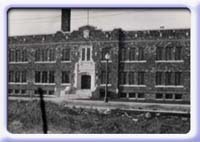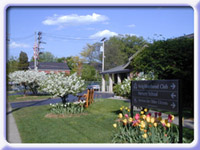 |
The second Neighborhood Club
building . |
|
|
1920's - Grosse
Pointe Neighborhood Club
helped to construct Cottage Hospital. Dexter M. Ferry, Jr. donated an eight-acre site on
Waterloo between St. Clair and Neff to the club, and a new community center and gymnasium
were built at 17151 Waterloo after a successful $150,000 fund raising drive. A rummage
sale, instigated by Mrs. Alger, took place in the gymnasium in 1929. The sale gave
birth to |
the Neighborhood Thrift Shop. The second Neighborhood Club
building was across the street from the present facility located on Waterloo in the City
of Grosse Pointe. |
1930's - During the depression, the
Neighborhood Club was the public welfare center for the area. The federal and county
emergency relief act programs were administrated by the club, and the personal concern
that has been a tradition of the club helped many families during those hard times. In the
30's, the recreation program enjoyed great popularity, and the Detroit Lions used the club
football field for practice. Elworthy said the Neighborhood Club assisted with community
needs during the trying decade.
1940's - The first Metropolitan
Club was held on the playfield, two paddle tennis courts were built, and Rotary Keeno
parties attracted thousands of participants. World War II forced the club to respond again
to changing community needs. The club continued to serve as a public welfare office,
volunteered to serve as Civil Defense Headquarters, and became a U.S.O. center. Over 3,000
service men were served breakfast by club volunteers before being sent overseas. Elworthy
was about the organization's contributions in the forties as he was about the thirties.
1950's - Grosse Pointe Neighborhood Club grew into a strong recreation center and
its gym was used by high schools for their basketball and football programs. Tennis boomed
and Grosse Pointe became known as a premier junior development program. Athletic fields
were used every available minute.
1960's - In 1962, Elworthy retired as Executive Director after 42 years
of service and was named Rotary's Citizen of the Year. He was replaced by Edgar Krattli,
who served the organization until 1971. In 1965, The Helen Newberry Joy Fund purchased the
Neighborhood Club property and gave it to the Grosse Pointe Board of Education.
Additionally, the old community center was torn down in 1966 after being condemned.
The club continued to operate and expand its programs using schools, churches,
and the Grosse Pointe War Memorial as activity sites. The club used funds from the sale
and $50,000 in donations to build the present 13,500 square-foot center at 17150 Waterloo
in 1968. Teen activities were a major component of club programs. The club emphasized drug
education and family counseling in cooperation with the Family Life Education Council
(F.L.E.C.). |

|
The former building at
17150
Waterloo |
|
|
1970's - Pauline Masak retired as Recreation Director in 1973 after 39
years of unexcelled service. The 1970s were a period of extensive growth and John Bruce
was named Executive Director in 1971. By 1975, the club's activities and membership had
more the doubled, and by the end of 1977, the Neighborhood Club had grown from 1,900
members in 1971 to 6,200 members. In October 1977, 150 senior adults celebrated the first
anniversary of the Village Club. A barrier free addition was added to the community center
on Waterloo in 1979. After 50 years of receiving Community Union, Red Feather and United
Foundation funds, the club became totally self-sustaining. Consequent with the halting of
governmental and non-profit funds, the organization shifted away from providing welfare
services to offering recreation and athletic programs. The Annual Fund was started and
generated $20,396 in its first year. The Neighborhood Club raised $550,000 with its first
capital campaign in 1979.
1980's - The Annual Fund more than tripled to the amount of $73,401.
Neighborhood Club staff, board members, and area families came together to celebrate the
club's 75th anniversary. The Bodman Computer Center was constructed inside the
Neighborhood club in 1987 with the help of the Matilda R. Wilson Fund and in memory of
Henry T. Bodman. The Neighborhood Club took a leadership role in establishing and managing
a Grosse Pointe Field Use Committee. Members of this committee represent various community
groups that share public facilities. The committee ensures safe, high-quality playing
fields for participants. Program attendance flourished with 17,000 participants.
1990's - Grosse
Pointe Neighborhood Club's focus this decade has been to provide
unequalled and expanding recreational programs to area families, and to secure long-term
financial stability for the organization. Over the last 20 years, the number of programs
has increased from 20 to more than 80. Growth has occurred in almost every activity. Women
and girls represent almost 50 percent of our total participation, largely due to the
efforts of Recreation Director Betz Johnson who celebrated 25 years of service to the club
in 1998. The club now organizes approximately 600 teams with 7,500 players, and schedules
more than 3,000 games, classes, and clinics each year. In 1993, a team sponsorship program
was established for area businesses and individuals to provide direct support to youth
teams. The Annual Fund celebrated a record $137,000 year. The club completed a successful
effort to raise $100,000 for the Van Dusen Endowment Challenge Grant, brining the club's
total endowment to $1,278,000. The operating budget has grown to 1,200,000. The
Neighborhood Club continued to cooperate with the Grosse Pointe Public School System and
local governments in using their facilities to provide enriching activities that bring
families together.
2000's - With courage and
vision, only 24 pioneering women initiated the Neighborhood Club at the beginning of the
20th century. Their avid commitment parallels how the men and women of the current
organization work for the community today. In the advent of the 21st century, the hard
work of staff, the generosity of community members, and particularly the efforts of the
board has helped the club have an impact, one that will surely continue to blossom in
future years. As Bruce said, "The only way [The Neighborhood Club] survives is with
true dedication and commitment it gets from the board. Grosse Pointe is blessed to have
such a facility, and people who care about it." |